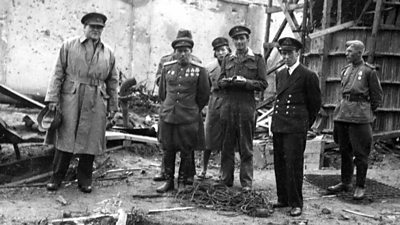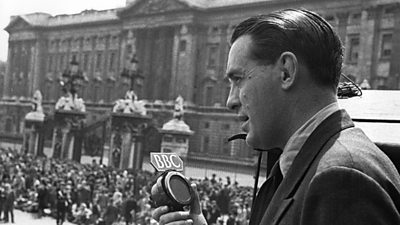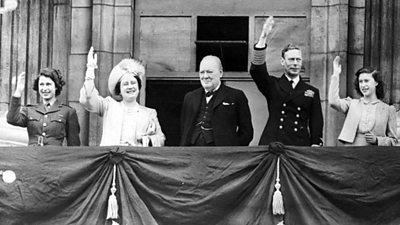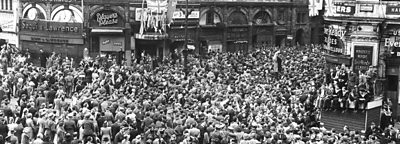VE Day
On 1 May 1945 the 大象传媒 announced Hitler's suicide. At 7pm the following evening programmes were interrupted with news that the Germans had surrendered in Italy. On 4 May they surrendered in Denmark, and the conflict was all but over.

But for some days no one was quite sure. On Monday 7 May crowds gathered outside Buckingham Palace but the news the nation had awaited for five years still did not come. It transpired that the British were waiting for Russian and American confirmation that the Nazis were vanquished.
At 1800 the 大象传媒 told bewildered listeners that Prime Minister Churchill would not be broadcasting that night - but then at 19.40 programmes were interrupted to say that the following day would be the first VE day. The war in Europe really was over.

Churchill's statement went out to the Empire the following day, but many were too excited to listen. They were celebrating.
In anticipation of victory, the 大象传媒 had prepared a number of special schedules - seven in all, one for whichever day of the week that victory happened to fall - and it launched into 10 days of celebration programming. A huge nightly retrospective of the war entitled "Their finest hour" was broadcast, along with victory specials of all the famous popular programmes of the war including, inevitably, ITMA.
Godfrey Talbot interviewed the Queen years later. She described the wild rejoicing that took place and how she wanted to go out on the balcony to see the crowds.
Broadcasting House, decked with British, American and Russian flags, was floodlit for the first time since the start of the war.

The euphoria was, of course, short-lived. The horrors of the Nazi concentration camps had yet to unfold, and the war in the Pacific was unresolved.
The British troops returned home (as did the correspondents) to rejoin their families and rebuild their lives and careers. And when, that summer, the atomic bombs at Hiroshima and Nagasaki finally did bring the war with Japan to an end, they also signalled the beginning of a new conflict.
For the next 40 years 大象传媒 correspondents and the 大象传媒 monitoring service would have a vital communications role in the Cold War.
